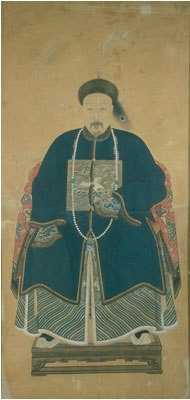Keying (official)
This is a Manchu name; the clan name is Aisin Gioro.
| Keying | |
|---|---|
 | |
| Viceroy of Liangguang | |
| In office 1844–1848 | |
| Preceded by | Qitian |
| Succeeded by | Xu Guangjin |
| Personal details | |
| Born | March 21, 1787 Beijing |
| Died | June 29, 1858 (aged 71) Beijing |
| Occupation | Politician |
| Major work | Signed Treaty of Nanjing, Treaty of the Bogue, Treaty of Wanghia and Treaty of Whampoa |
Keying (Manchu: Kiyeng; Chinese: 耆英, p Qíyīng, w Ch‘i-ying; 21 March 1787[1] – 29 June 1858), clan name "Aisin Gioro" (Chinese: t 愛新覺羅, s 爱新觉罗, p Àixīn Juéluó), was a Manchu statesman during the Qing dynasty who conducted the settlement of the First Opium War with the British and other western powers between 1843 and 1847. He was sent to negotiate once again in 1858 to settle the Arrow War, but the settlement was repudiated by the Daoguang Emperor and he was forced to commit suicide. [2] He was well regarded in the Western world and well received in Hong Kong. [3]
Background and early career
Being a descendant of Nurhaci's ninth son Babutai, Keying was a member of the imperial house of Aisin-Gioro and belonged to the Manchu Plain Blue Banner in the Eight Banners. Qiying held several prominent posts in the Qing government and was demoted several times because of corruption in office, but managed to regain his position as a leading official in the Qing court.
Role during the Opium Wars
In 1842, the Daoguang Emperor entrusted Keying to conclude a peace treaty with the Britain following the First Opium War, and he was chiefly responsible for negotiating and signing the Treaty of Nanking with the British on 29 August 1842. In the following years, Keying also concluded the Treaty of Whampoa with France, the Treaty of Wanghia with the United States and the Treaty of Canton with Sweden-Norway. This was the first group of treaties known as the "Unequal Treaties" in China.
In 1858, the Xianfeng Emperor ordered Keying to negotiate a peace treaty with Britain and France in order to conclude the Second Opium War. During the negotiations, the British interpreters Horatio Nelson Lay and Thomas Francis Wade sought to expose Keying's duplicity by producing documents the British had captured in Guangzhou, in which Keying expressed his contempt for the British. Humiliated, Keying promptly left the negotiations in Tianjin for Beijing and he was later arrested for having left his post in contravention of imperial order. He was sentenced to death by the Imperial Clan Court, but was allowed to commit suicide instead.
Commemoration
The junk Keying, the first Chinese ship to sail to Britain and America, was named after Keying. Keying and Marine House in Hong Kong, which became part of the Hong Kong Hotel[4] in 1866, was also named after him.
Notes
- ↑ Birthdate according to Gao Zhonghua, Sushun yu Xianfeng zhengju (Jinan: Qilu shushe, 2005), p. 165, n. 1.
- ↑ Fang Chao-ying, "Ch'i-ying (Kiying)," in Hummel, Arthur William, ed. Eminent Chinese of the Ch'ing Period (1644-1912). (Washington: United States Government Printing Office, 1943), Vol I, pp. 131-134. Online at Qing Studies Workshop (link at left).
- ↑ "Visit of High Imperial Commissioner Keying to Hong Kong". Curiosities afterward. Romance of modern travel.
- ↑ "Our History". The Hongkong and Shanghai Hotels, Limited. 2012-02-22.
References
- Fairbank, John King. "The Manchu Appeasement Policy of 1843." Journal of the American Oriental Society 59, no. 4 (1939): 469-84.
- Fang Chao-ying, "Ch'i-ying (Kiying)," in Hummel, Arthur William, ed. Eminent Chinese of the Ch'ing Period (1644-1912). (Washington: United States Government Printing Office, 1943), Vol I, pp. 131-134. Online at Qing Studies Workshop (link at left).
- "The Indian mail, Issue 1".
| Government offices | ||
|---|---|---|
| Preceded by Niu Jian |
Viceroy of Liangjiang 1842-1844 |
Succeeded by Bichang |
| Preceded by Qitian |
Viceroy of Liangguang 1844-1848 |
Succeeded by Xu Guangjin |
|